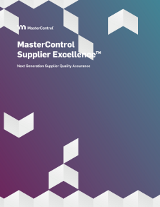
GxP Lifeline
Improving Quality Through Supplier Audits

The school year is wrapping up and students are studying for or have just taken their final exams. For the class of 2022, this is possibly the last set of exams they'll have to take. That's an exciting thought, but those who pursue a career in quality will face another kind of exam — audits. Supplier audits in particular are important as manufacturers face supply chain issues that force them to seek out new suppliers.
Supplier audits are the cleverly disguised exams of the manufacturing world. Suppliers and manufacturers are held to high quality standards and both must adhere to them to ensure final products are safe and effective. The key to this is a thorough supplier audit in which the supplier and manufacturer work together to improve quality throughout the supply chain.
Elements of Supplier Audits
At the beginning of the semester, students are given a rubric so they know how they will be graded during the class. If they meet the requirements of the rubric, they should get an A in the class. If not, their grades will suffer. Similarly, auditors need to let suppliers know what they expect from them. Grading supplier quality assurance should include the following categories:
- Quality processes.
- Business capabilities.
- Compliance with current good manufacturing practices (cGMPs).
A supplier can be given a grade in each of these elements to help the manufacturer determine where improvement is needed and if the two businesses can continue to work together. Of course, these grades are just components of a supplier's GPA. If a supplier is lacking in some areas, a manufacturer might still choose to work with them if they have continuous improvement plans that guarantee quality assurance in their supply chain.
Importance of Supplier Quality Assurance
A key part of the supplier audit is ensuring proper quality assurance. Quality assurance consists of proactive measures that take place beforehand to ensure quality. This is the scholastic equivalent of forming good study habits. If you study, you do well on a test. If you have effective quality assurance, you have fewer quality events.
During a supplier audit, manufacturers should look for a robust quality assurance program and evidence that it is followed. It's quite simple to write a standard operating procedure (SOP) indicating a process is done correctly. However, unless that SOP is followed it does nothing. A good supplier quality assurance program gives manufacturers the reassurance that the supplier's behavior during an audit is not just for the sake of the audit, but the standard for the organization.
Importance of Quality Management
While an audit may be similar to taking a test and being graded, the relationship between a supplier and manufacturer isn't that of a student and teacher. The manufacturer isn't there to dictate and the supplier doesn't have to submit to every request of the manufacturer. Rather both businesses work together in a mutually beneficial partnership. The end result improves quality and safety overall. This is where quality management comes in.
Not to sound like a class clown, but the key to quality management is, well, managing. And a process can't be managed if an organization is only focused on part of it. That's one of the reasons that quality needs to extend across the product life cycle and throughout the supply chain. During a supplier audit, this idea needs to be front and center for both companies. If the auditor gives the supplier a failing grade in something, they need to talk about it. Audits should be continual improvement activities — not adversarial confrontations. Quality management processes and any associated software systems should be used in both organizations to ensure quality.
Conclusion
COVID-19 increased the importance of solid manufacturer/supplier relationships. The supply chain proved to be unexpectedly vulnerable in some areas. A good way to combat this is by creating new relationships with new suppliers. And ensuring quality throughout the supply chain means conducting supplier audits. With more suppliers and more audits being done remotely, supplier management software is proving vital to manufacturers.

